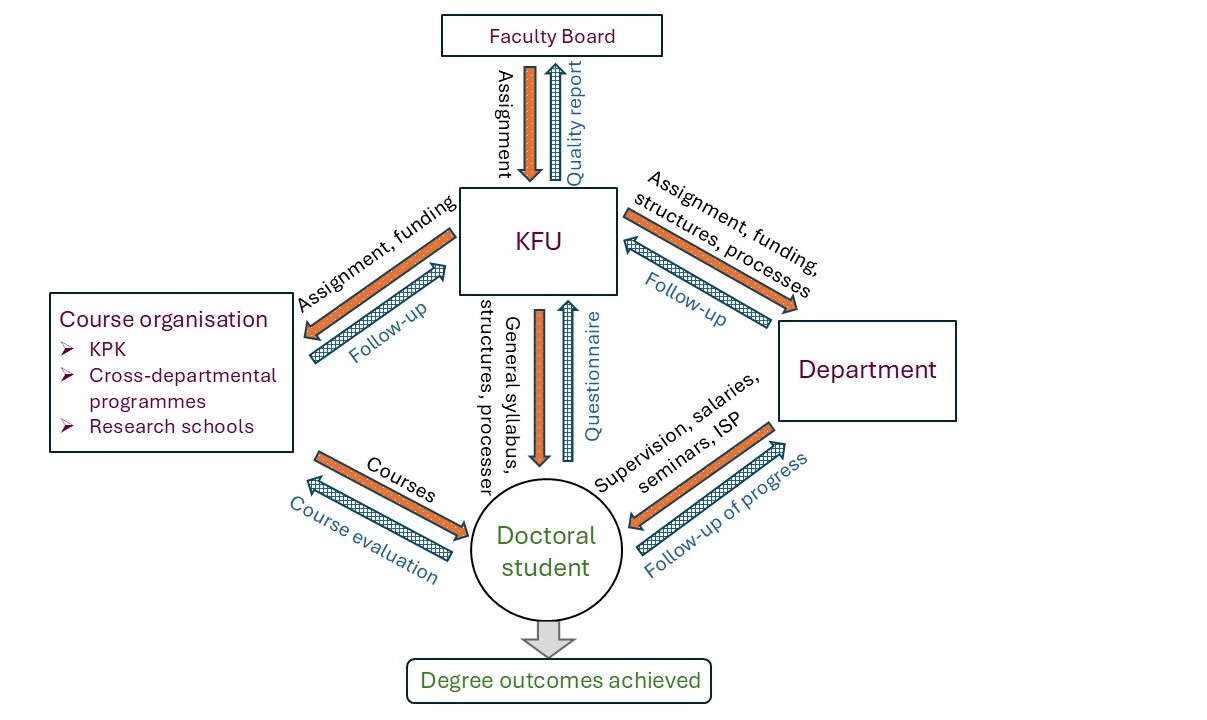Principles for systematic quality assurance in doctoral education
Systematic quality work involves monitoring, identifying strengths and areas for development, and making fact-based decisions on quality development priorities.
Quality assurance in doctoral education is based on the following fundamental principles:
- High quality in KI's doctoral education means that all doctoral students have the conditions necessary to achieve their degree outcomes within the specified time.
- The aim of quality assurance work is to ensure that KI's doctoral education maintains high quality by following up, developing and maintaining appropriate and effective structures, resources and processes.
Responsibilities
The Faculty Board is responsible for ensuring that systematic quality assurance work within research and education is developed in such a way that it is appropriate and resource-efficient in order to ensure high quality.
The Committee for Doctoral Education (KFU) is responsible for developing and strengthening KI's doctoral education. This includes following up, identifying areas for development and implementing improvements.
The Head of Department has overall responsibility for the quality of the department's activities. This includes, among other things, making decisions in accordance with delegations from the University President, e.g. deciding on the admission of doctoral students and appointing supervisors within the framework decided by KFU.
The Directors of Studies for Doctoral Education have a mandate from KFU to provide support for doctoral students and supervisors and to work to ensure that the department offers high-quality doctoral education.
The coordinators of doctoral courses have a mandate from the KFU to develop and monitor the quality of doctoral courses and course offerings.
The image below shows the paths for governance and monitoring within doctoral education.

Overarching processes
According to KI's guidelines for systematic quality work, systematic quality work is based on the following two overarching processes:
- Internal follow-up
- Self-initiated external review
These processes aim at identifying strengths and the need for quality development.
Internal follow-up
KFU follows-up doctoral education and its conditions in the following ways:
- Exit poll survey (Exit poll)
- Dialogues
- Departmental reports
- Quality assurance in doctoral courses
Exit poll survey
A questionnaire is sent to all doctoral students soon after their thesis defence.
Information on purpose, content, handling and result
Steering document: Instructions for exit poll survey (in Swedish)
Dialogues
Purpose of an oral dialogue:
- Building relationships and mutual trust
- Keeping track of what's going on at the departments and giving central management/administration insight into the challenges and priorities
- Identifying good examples
- To inform and implement new quality development activities
Steering document: Instructions for the doctoral education dialogue (in Swedish)
Departmental reports
Every four years, all departments conduct a self-assessment of their responsibility for doctoral education and doctoral students. This must be documented in a written report that is submitted to KFU.
The purpose is that reflection and discussion can lead to important insights. The report then forms the basis for improvement work, both at the department and centrally.
Steering document: Instructions for follow-up of the departments responsibilities (in Swedish)
Departmental reports 2025 (Swedish)
Quality assurance in doctoral courses
KI has a cross-departmental organisation for coordinating courses and course offerings.
Quality assurance work includes:
- Course evaluations from course participants
- Course analyses from course providers
- Quality development
- Follow-up of the thematic doctoral programmes
Read more: Course evaluation and analysis of doctoral courses
Steering document: Instructions for quality assurance of doctoral courses (coming soon)
External review
Every 8 years, KI’s doctoral education is reviewed by external reviewers.
KI uses the same assessment areas as the Swedish Higher Education Authority (UKÄ) do when they evaluate doctoral education. Focus is on how KI assure that all doctoral students have the prerequisites needed to achieve the degree outcomes, and on how KI make sure that the outcomes have been achieved at the time of examination.
The external reviewers will base their assessment on:
- a university-wide self-evaluation
- interviews with representatives of different groups and roles
Steering document: Steering document for external review of KI´s doctoral education
External review 2025
Improvement work
The Committee for Doctoral Education (KFU) analyses the quality of KI's doctoral education annually based on the follow-up conducted during the year, identifying areas for improvement. These form the basis for planning and prioritising measures and activities.
When an area is identified as an area for improvement, it becomes a theme for follow-ups in the coming year, e.g. for the operational dialogue, and determines which investigations or evaluations are to be carried out.

Quality reports from the Committee of Doctoral Education (in Swedish)
Structures to provide conditions for high quality
In order to provide doctoral students with the right conditions to achieve the degree outcomes, KI has developed the following processes and structures:
- Digital individual study plans
- Yearly follow-ups
- Half-time review
- Assessment of conditions when establishing new doctoral positions
- Assessment of suitability to become supervisor (green light)
- Supervisor training
- Reports on learning and development and achieving the outcomes for degree
- Course syllabi
- Course catalogue
- Comprehensive web information
